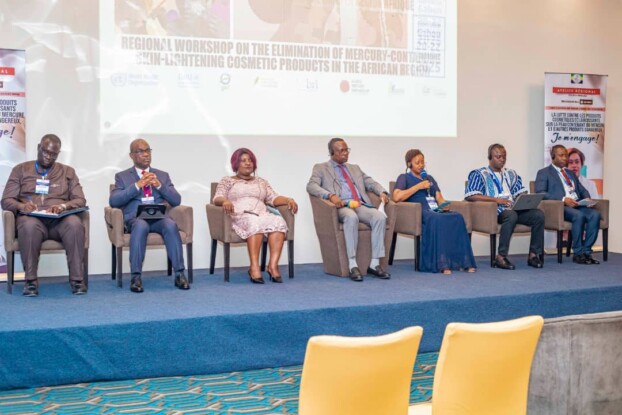Nigeria’s Minister of State for Health and Social Welfare, Dr. Iziaq Adekunle Salako, has alerted on the public health crisis caused by skin-bleaching products in the country.
Salako called for urgent regulatory enforcement and cultural reorientation to curb the harmful practice.
Dr. Salako, who disclosed this while speaking at a high-level workshop in Libreville, Gabon, on Wednesday, highlighted Nigeria’s troubling distinction as “the world capital of skin bleaching,” with 77% of Nigerian women reportedly using skin-lightening products, according to the World Health Organization (WHO).
“Despite the well-documented harmful effects of these products, skin bleaching remains prevalent in Nigeria and across Africa, driven by societal pressures linking lighter skin to beauty, success, and social mobility,” Dr. Salako said.
According to him: “This phenomenon is not just a health issue but a deeply rooted cultural challenge.”
While underscoring the severe health risks posed by products containing hazardous substances such as mercury, hydroquinone, and heavy metals like lead, cadmium, and arsenic, Dr. Salako cautioned: “These ingredients can cause skin damage, organ toxicity, and even cancer.”
He stressed that mercury exposure is particularly dangerous, leading to renal and neurological damage, while hydroquinone has been linked to ochronosis a bluish-black discoloration of the skin and potential carcinogenic effects.
The health minister outlined the Nigerian government’s measures to tackle the issue, including the Cosmetics Products (Prohibition of Bleaching Agents) Regulations 2019, which ban harmful skin-bleaching agents and restrict hydroquinone use to two percent.
He commended the National Agency for Food Administration and Drug Control (NAFDAC) for ensuring that all cosmetic products sold in Nigeria meet safety standards through rigorous testing and certification.
“Through the Cosmetics Safety Management Programme, we’ve carried out sensitization campaigns, community outreach programs, and market surveillance to educate the public and remove hazardous products from circulation,” Dr. Salako said.
Beyond regulations, Dr. Salako called for a cultural shift to challenge societal beauty standards that perpetuate skin bleaching.
“We must revive the ‘Black is Beautiful’ movement to celebrate Afrocentric beauty and dispel the myth that fairer skin is better,” he stated.
He added that the Federal Ministry of Health is working with influencers, community leaders, and celebrities to promote natural beauty and self-acceptance. “Messages emphasizing that beauty is not defined by complexion are key to behavioral change,” he noted.
Dr. Salako urged African countries to develop national policies on cosmetics and enforce global conventions like the Minamata Convention to eliminate mercury in skin-lightening products.
He also urged the World Health Organization (WHO) to establish a World Skin Health Day to raise awareness about harmful cosmetic practices.
“Nigeria is committed to protecting public health through safe cosmetic practices. The upcoming National Policy on Cosmetics will provide a comprehensive framework for ensuring the safety and quality of cosmetic products in the country,” he said.
Dr. Salako’s remarks highlight the urgent need for a multidisciplinary approach to address the skin-bleaching epidemic, combining regulatory enforcement, public education, and cultural reorientation to protect the health and dignity of Nigerians.









